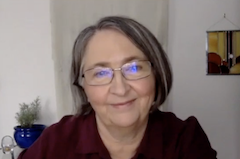What would happen if you had no rules about being a good person, a nice person, or a valuable person? Would you naturally care about people? Would you want to be decent and kind?
What would you do with your days if you had no financial or social pressure to do any particular thing? Would you lay around and do nothing forever? Would your natural curiosity and interest in the world surface?
What if your parents never taught you the Golden Rule: Do unto others as you would have them do unto you? What if you didn’t know that “good” people tell the truth? What would you naturally do? Would you experiment and learn what drives others away and what would help you feel closer to them?
We see a lot of selfish, reckless behaviour right now. Entitled. Narcissistic. We are horrified to see police and military dispersing citizens with tear gas. We also see police taking a knee alongside #blacklivesmatter protestors. Citizens in Minneapolis are buying groceries and leaving them on sidewalks for people in areas where riots have shut down stores. Science tells us that people evolved to survive best through cooperating with each other. It is also true that humans are capable of a range of behavior.
We are conditioned to “go along” during childhood when our survival literally depends on it. School conditions us by approving when we act in certain ways and punishing us when we act in other ways. The harsh world of teenage social ostracizing further keeps us in line. Most teens are scarred by that process. We then move into negotiating adult work and personal relationships.
In our daily practice, we begin with people checking in to their overall felt sense of themselves in that moment. What does it feel like in your body? What are the sense perceptions of air flowing in your nose and clothing on your skin? Are areas of your body feeling tightness and pain? Are you clenching your teeth or feeling edgy and unsettled? Some days we have the pleasure of feeling calm and relaxed.
First we check in with ourselves, then into what we would like to do next. Would it feel more nurturing to lie down and let your body rest, or to get up and shake, or walk? For years I struggled with sitting up for meditation and spent most of the time in pain with my back or legs falling asleep. When I wasn’t engaged with that, I was often following trains of thought. There was very little actual stillness or silence.
As we meet and practice online, it literally doesn’t matter to anyone else if we sit up, sit leaning back in a chair, lie down or walk with headphones on. No one will know if we fall asleep and we won’t disturb anyone if we snore, yet we still might be shaming ourselves for not “doing it right”.
Throw out the rules. There is no right or wrong way to do a relaxation or your life. Develop non-judgmental awareness, then experiment and see what works best for you in any given moment. Struggling to keep an anxious body from fidgeting doesn’t help. There are reasons why meditation teachers encourage (or demand) people sit still with an upright spine. That doesn’t mean it is always the best thing to do. The end goal of meditation is not to be able to sit rigidly still for hours. It is to relax our body, get to know our mind, and develop good will and friendship with ourselves. Then we naturally move into stillness and depth.
What is your window of tolerance for tuning in to what you need and giving it to yourself? A common trauma response is for people to have such high standards of perfect behavior that they literally can never be good enough.
Is that you? Do you push yourself to succeed and shame yourself when you fall short? What a relief it would be to let that go!
Give yourself permission to notice what you need and give it to yourself in low to medium risk situations. Widen your window of tolerance by saying no when you don’t want to go along, or naming bullying when you see it (when safe to do so). Exercise the muscle of deciding on the best course of action for you, then follow through. When you back away or don’t handle it with 100% grace, let yourself off the hook. It’s a practice.
We are working with seeing through deep conditioning. Shaming keeps it in place. No matter what other people are doing and saying, it is a powerful act of resistance to stop shaming ourselves. We begin to trust that we naturally want to do the “right thing” because we are a good person, not because we relentlessly drive ourselves to follow the rules.
How would you behave if you lived moment to moment in alignment with your values instead of following arbitrary rules. Become a powerful force for truth and justice. We can all do this, and it begins with deciding whether to lie down or sit for relaxation.


